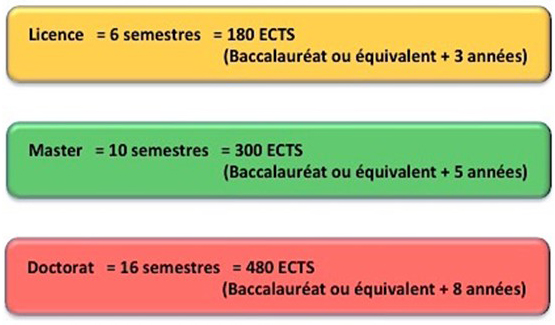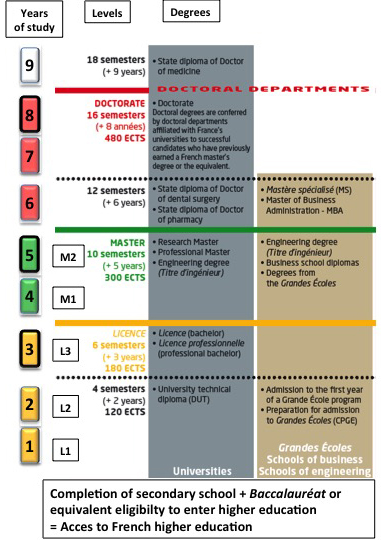The IPNP actively participates in secondary education or equivalent (up to 17 years old students) and postsecondary education or equivalent (Professional and Technical Education programs and LMD system : Bachelor, Master and PhD degrees).
Research Apprenticeships (source : Inserm)
The « Research Apprenticeships » is an initiative developed by the association "L’Arbre des Connaissances" (The Tree of Knowledge) with the goal of raising youth awareness of scientific research.
Nearly twenty research institutes host teenagers who work in teams of two composed by a student in grade 9 (14 years old) and a student in grade 11 (16 years old).
Students are supervised by a professional (researcher, engineer, postdoc or PhD student) throughout the school year and lead a research project. They discover the life of a laboratory and develop their critical thinking skills through the experimental method. This initiative takes place on Wednesday afternoon, with 8 to 10 Wednesdays during the school year. “Journalists apprenticeships” follow “research apprenticeships“ to make newspapers or films. At the end of the course, students present their work to their classmates, teachers, families and researchers in a meeting that is organized at the research center.
More informations :
http://www.arbre-des-connaissances-apsr.org/association/
http://www.inserm.fr/enseignants/espace-jeunes-apprentis-chercheurs
Nicolas Ramoz and Laurence Lanfumey ensure the organization of this device at the IPNP
The IPNP offers short-term traineeships to students undertaking higher education programs in both professional and university studies.
Applications can be sent by mail or email (see joins us and Directory menu). It is preferable that students indicate the team(s) in which they wish to intern. The request will be sent to the responsible of the team(s).
IPNP members that are involved in higher education programs:
* David Tareste
Co-director of the "Frontieres du Vivant" PhD Program (ED n°474).
* Catherine Oppenheim
Manager of Bioimaging speciality of the "Master Program in Biomedical Engineering" of the University Paris-Descartes and the Paris Institute of Technology (ParisTech).
* Pascale Varlet
Teacher at Cancerology speciality of "Master Program in Biology and Health" of the University Paris-Saclay.
* Virginie Tolle
Co-manager of the Endocrinology and Metabolism speciality of "Master Program in Biology and Health" of the University Paris-Saclay.
* Nicolas Ramoz
Manager of the UE6 of the Neurosciences et Comportements speciality of “Master Program in Cell Biology, Physiology and Pathology (BCPP)” of the University Paris Diderot University Paris Descartes.
* Lydia Danglot
- Teacher at Neurosciences speciality of “Master Programme in Integrative Biology and Physiology (BIP) “ of the University Pierre et Marie Curie- Ecole Normale Ecole of Paris.
- Teacher at “Master Programme in Genetics“ of the University Paris Diderot.
- Teacher at “Master Program in Cell Biology, Physiology and Pathology (BCPP)” of the University Paris Diderot- University Paris Descartes.
- Teacher at Tissue, Cell & Gene Biotherapies speciality of “Master of Science Biology & Health“ of the Faculty of Medecine Henri Mondor.
- Teacher at “Master Program in Biology“ of the Ecole Normale Supérieure de Paris.
Professional and Technical Education programs
Short programs in higher professional education last two years. After these two years, students get a diploma that provides professional insertion. These diplomas are of three different kinds: the “Brevet de Technicien Supérieur” (BTS), the “Diplome Universitaire de Technologie” (DUT), and the “Diplome d’Etudes Universitaires Scientifiques et Techniques” (DEUST).
The IPNP host students for short-term traineeships that allow them to learn laboratory techniques or to initiate to research works. Trainees are welcomed in BTS (Advanced Technician Certificate) and DUT (University Institutes of Technology).
Bachelor, Master and PhD degrees (source : Campus France)
The degrees awarded in French higher education reflect a common European architecture. The LMD system—for Licence (Bachelor), Master, and Doctorate (PhD)—is based on the number of semesters completed after leaving secondary school and their equivalent in European credits under the European Credit Transfer and Accumulation System (ECTS: Credits earned under the European Credit Transfer and Accumulation System are recognized throughout Europe. A full year of academic work represents 60 ECTS credits).

Adapted from Campus France
Bachelor and Master degrees are delivered by the Universities and the «Grandes Ecoles». Doctorat (PhD) studies are organised by "écoles doctorales" (Doctoral Schools). Any holder of a Masters degree or an equivalent non-French degree may apply for a PhD program. Trainings usually lasts for 3 years and leads to a "Docteur" degree after a thesis defence. Doctoral Schools include research laboratories working on the same scientific field. The Doctoral Schools themselves supervise the selection, registration and training of Doctoral students.

Adapted from Campus France
More information about :
French higher education
How courses are organized
PhD degrees in France (Doctorat)
The Institute is attached to 4 Doctoral schools of University Sorbonne Paris Cité (USPC) listed below. The USPC is a federation of 8 Higher Education, including the Universities Paris Descartes-Paris 5 and Paris Diderot-Paris 7, and 5 Research Performing Organisations.
The BioSPC Doctoral School (ED n°562, ED n°157)
The fields covered by BioSPC include : Cellular and Molecular Biology, Developmental Biology, Immunology, Infectious diseases, Genetics, Microbiology, Neurobiology, Physiology, Physiopathology, Reproduction, and Ageing.
More information
The Brain-Cognition-Behaviour Doctoral School (ED3C, ED n°158)
The study of how the nervous system functions is made up of diverse aspects which are covered by multidisciplinary approaches. ED3C has two specialist fields - Neuroscience and Cognitive sciences. Cellular and molecular neurobiology, neuropharmacology and the study of the nervous system's development are ED3C's strong areas. Many of our teams work in the integrative neuroscience which includes the fields of experimental and behavioural neurosciences and the cognitive neuroscience. Our modelling sector is based on data obtained in vitro and in vivo and is also supported by ED3C.
More information
The Cognition, Behaviours, Human behaviours Doctoral school (3CH, ED n° 261)
Doctoral school 261 includes training and laboratories within a wide range of research in the various fields of psychology, cognitive science, cognitive neuroscience, ergonomics, and professional sectors related to it.
More information (in French)
The Frontiers in Life Science Doctoral school (ED n°474)
The FdV Doctoral School is an international and interdisciplinary program that promotes ambitious research projects involving interactions between a wide range of academic disciplines (biology, physics, informatics, genetics, cognitive sciences, medicine, human and social sciences, etc.) in the pursuit of understanding living systems and/or exploring new ways to teach, learn, and do research.
More information
Every year, the Institute hosts approximately 15 Bachelor students, 20 Master students and up to 20 new PhD students.
More than 30 students are currently preparing their Ph.D. within the IPNP teams, in Neuroscience as well as other specialties (cell biology and biophysics, neuro-psychiatric disorders, addiction and mood disorders, memory, cognition and aging, pain and cerebrovascular stroke).